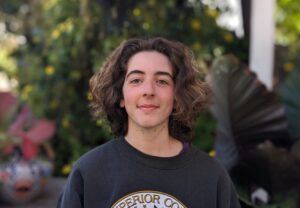Pasadena Mennonite Church helped foster Celeste Sharp’s passion for the environment. This interest has led Celeste to pursue an education agroecology, with hopes of providing people with more sustainable food systems and practices.
This blog is part of the ongoing Learn, Pray, Join: Climate Justice: Seeking Shalom series. Lea la versión en inglés aquí.
 Celeste Sharp grew up attending Pasadena Mennonite Church. Celeste is currently a first year student at the University of California Santa Cruz and is studying agroecology.
Celeste Sharp grew up attending Pasadena Mennonite Church. Celeste is currently a first year student at the University of California Santa Cruz and is studying agroecology._________________________________________________
I wasn’t born a Mennonite, but growing up at Pasadena Mennonite Church (PMC) was essential for the development of my perspective on climate change and environmental justice. Seeing PMC’s intentionality and care for the environment made me want to pursue an education in agroecology and food systems.
At PMC, I saw intentional efforts made toward repairing the systems that many of us have benefited from. I have been inspired by many members of PMC, who have found their own ways to make a difference in the world around them. I appreciate the ways that PMC allows people to explore their faith and use their individual gifts to participate in the church, however they feel comfortable. I found my place working with the environment and studying agroecology.
I have felt so much love and support from my church community, as I have grown and discovered more about myself. I am confident that PMC will support me in whatever I choose to pursue and will be willing to have important conversations about what it means to be a person of faith, as well as an advocate for people and the environment.
PMC has also connected me with many opportunities to be involved in environmental justice and sustainability. One of these opportunities is through the Coalition to Dismantle the Doctrine of Discovery and the Maya-Mennonite working group.
This group has given me a space to think about the effects of colonization on the environment, as well as an opportunity to participate in the work they are doing. In May, I will be joining them on a delegation to Hopelchén, Mexico, to participate in a seed festival and connect with the local Mennonite and Indigenous communities in the area.
I am coming into this delegation as a student and a learner. I want to know more about the traditional practices of both groups and learn more about how those practices inform their ways of life. As an agroecology student, I am interested in how food influences culture and how different farming practices have shaped the ways that people interact.
Food means so much more than just sustenance; it is an expression of culture and values.
Colonialism has had a huge impact on the ways that Indigenous people interact with the land around them; giving back to these communities means supporting their efforts and allowing them to steward the land according to their cultures.
Studying agroecology is one of the ways that I feel called to serve God and my community. Furthering connections with food and land is essential to dismantling the systems that have caused harm to people and the environment. I want to use my knowledge to give more people access to sustainable practices and food systems.
Living in an urban area has made me realize that there is a need for more resources that teach people about food systems and how to implement sustainable practices with limited space, time and money. I want to serve underrepresented communities and create spaces for them to get involved with their own food. I want to do this by creating community gardens, teaching people how to incorporate sustainability into their lifestyles and getting young people involved in agroecology. PMC and the broader Mennonite church has played a big part in helping me develop these ideas and allowing me to explore them in an authentic way.
I am so grateful to have this community that lets me explore my faith and inspires me to make a difference. I would not be the person I am today without these incredible people, who have shown me what it means to be an advocate for others and a steward of the land.

As followers of Jesus, we seek God’s dream of shalom for all people and all of creation, including our climate. Shalom requires that we seek justice and healing for our relationships with God, with one another and with the earth that sustains us.
You are invited to get involved with Learn, Pray, Join: Climate Justice: Seeking Shalom.
Support Mennonite Church USA’s Peace and Justice Initiatives by giving here.
The views and opinions expressed in this blog belong to the author and are not intended to represent the views of the MC USA Executive Board or staff.
Interested in submitting a blog for Menno Snapshots? Please see our blog guidelines here.

